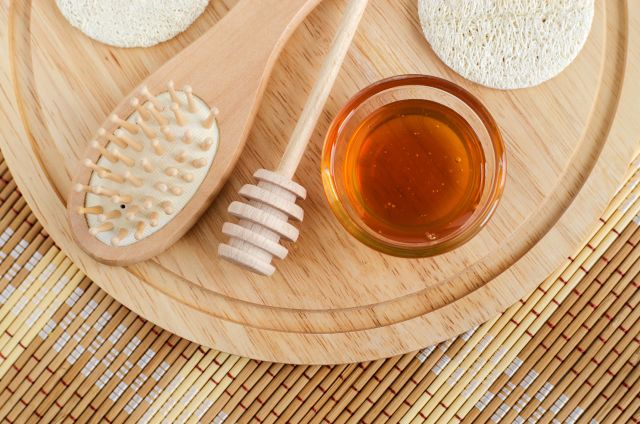Updated on May 12, 2022.
No pantry is fully stocked without a bear-shaped bottle of honey. Whether you drizzle it over pancakes, oatmeal, or melt it into tea with a squeeze of lemon, honey has a multitude of uses as a natural sweetener.
Honey’s utility doesn’t stop there. Read on to learn some of the surprising ways you can use honey in all walks of life.
Lip balm
Do you have chapped lips? Apply a drop of honey directly to your lips and let it sit. A 2020 review published in the journal Molecules analyzed evidence on the health properties of bees’ products and suggested that honey can provide relief for rough and chapped lips. Honey serves as a natural moisturizer that hydrates the lips, leaving your kisser feeling soft and smooth.
Hair conditioner
Honey is a natural source of antioxidants and boasts anti-inflammatory activity. Research shows that adding antioxidants to your shampoo and conditioner can benefit your scalp health and may even help prevent hair from thinning. A 2020 study published in Dermatologic Therapy showed that adding antioxidant and anti-inflammatory agents helped people who experience frequent hair loss.
Create your own natural hair conditioner by mixing a half cup of honey with a quarter cup of olive oil. Slightly warm the mixture on the stove. Test it to make sure it’s not too hot, then apply it to your hair and allow it to soak in. Rinse with cold water.
Breath freshener
Some research suggests that honey can freshen your mouth and prevent bad breath. A 2018 study published in the Journal of Emerging Investigators suggests that Manuka honey was nearly as effective as Listerine or ACT mouthwashes in getting rid of Porphyromonas gingivalis, a bacteria that commonly produces bad breath. Honey used with or without antiseptic ingredients were similarly effective in stopping bad breath, according to a 2021 study published in Enfermer ía Clínica.
If you experience bad breath and want to test out the benefit of honey, try mixing a quarter cup of water, one teaspoon of honey, and one teaspoon of lemon juice. Gargle the mixture for three minutes to freshen up.
Need another reason to consider adding honey to your oral hygiene regimen? A 2019 review published in the Journal of Oral BioSciences indicated that honey is also helpful in treating dental plaques, cavities, gingivitis, and several bacterial infections.
Skin softener
Honey can keep your skin naturally soft and clean. A 2020 review of bee products in the journal Molecules described honey as an abundant source of vitamins and minerals that can nourish the skin. Nutrients found in honey can also help with skin irritation and rough hands caused by frostbite. A 2019 study published in the British Journal of Nursing found that skin cream made with honey helped prevent skin damage from dry skin or rashes.
Add two tablespoons of honey to a cup of hot water and let it dissolve. Then add two to three drops of lavender essential oil. The mixture can then be added to your bath.
It’s also a potential anti-cancer agent
Some evidence even suggests that honey could help with certain types of skin cancer. Research suggests that the immune benefits of honey could help with actinic keratosis, a condition marked by rough skin patches caused by excessive sun exposure that can become cancerous.
A 2018 study published in Case Reports in Dermatological Medicine details the case of a 66-year-old with actinic keratosis on his hand. Applying a topical cream made of Kanuka honey for three months led to remission with no skin lesions reported after a 9-month follow-up.
According to a 2019 research review published in Clinical Nutrition, honey contains several compounds—flavonoids and phenolic acids, for example—that may promote anticancer activity. This may include helping to stop the spread of malignant cells and boosting the immune system.
Remember that research on honey is ongoing, and there are no human clinical trials that prove it prevents or treats cancer. Be sure to follow the treatment recommendations of your healthcare provider and never use honey as a sole treatment for cancer.







